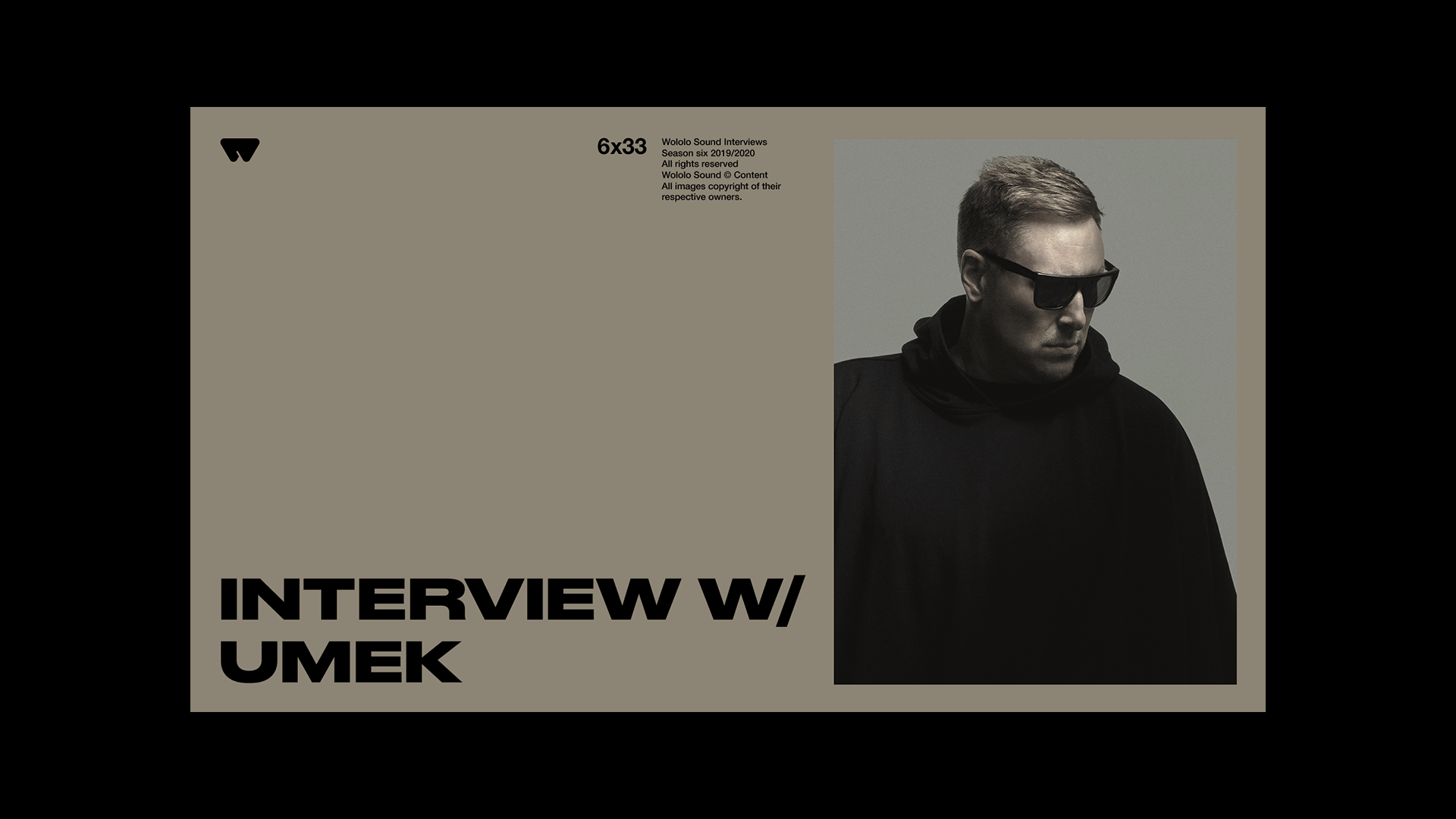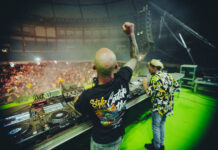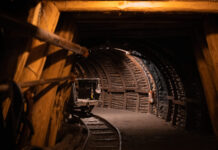Sabemos que estos días están siendo difíciles para todos, por eso volvemos con una nueva entrevista para pasar estos momentos de la forma más liviana posible. Nuestro invitado de hoy es todo un experto en su campo: el techno. UMEK es uno de los pioneros de la electrónica en Eslovenia, su país natal, y una de las figuras de referencia a nivel mundial. Con sus sonidos, su sello 1605 y su consolidada experiencia, ha conseguido destacar en la élite internacional. Hoy se abre a nosotros para dejarnos conocer en profundidad sus futuros proyectos, sus inicios en la escena y su visión sobre la misma.
Entrevista a UMEK / Interview with UMEK:
Wololo Sound – Eres conocido como uno de los artistas que inició la escena electrónica en tu país natal, Eslovenia. ¿Te resultó difícil difundir la música en el país?
UMEK – Fue un verdadero desafío. Todo esto fue a principios de los 90, justo después de que Eslovenia se independizase, abandonase el comunismo y se abriese a occidente. Coincidió con el “boom” de la música dance y la cultura rave, y rápidamente nos entusiasmamos por ello. Empezamos a construir la escena sin ningún conocimiento apropiado ni conexiones, antes de que apareciese Internet y cuando en la radio todavía no ponían este tipo de música. Había una gran falta de infraestructura y las guerras todavía estaban activas en esta región, lo que significaba que contratar talento internacional era casi imposible. Pinchábamos en pequeños clubs (sobre todo de estudiantes y alternativos), hacíamos raves en los parques de bomberos, almacenes vacíos y durante el verano, organizábamos raves al aire libre en el campo. Luchamos contra los prejuicios, fuimos etiquetados como drogadictos, hippies y raritos. Una vez un pequeño periódico nacional declaró que las vacas pararon de dar leche debido a una fiesta ruidosa que habíamos hecho en un pequeño pueblo cercano. Tuvimos que ser ingeniosos e improvisar mucho, pero la escena creció y durante mucho tiempo tuvimos algo auténtico. Esto pasó a ser conocido como el ‘Slovenian Techno Sound’. La popularidad de ciertos artistas aquí no era la misma que en la mayoría de países europeos – estábamos muy orientados hacia el techno. El trance nunca fue algo grande aquí, mientras que sí lo era en Reino Unido y los Países Bajos. Nuestros mayores héroes eran los artistas de techno y hard techno que apoyaron la escena en sus principios. Cristian Varela, por ejemplo, fue y todavía es uno de los artistas de techno más admirados en Eslovenia.
Wololo Sound – You are known as one of the artists who initiated the electronic music scene in your home country, Slovenia. Was it difficult to spread the music around the country?
UMEK – It was quite a challenge. This was in the early 90s, just after Slovenia became independent, abandoned communism and opened to the West. This coincided with the boom of dance music and rave culture and we quickly got passionate about it. We started building the scene without any proper knowledge and connections, before the internet and in time when radio stations didn’t play this kind of music. There was a major lack of infrastructure and wars were still raging in the region, which meant booking international talent was almost impossible. We played in small (mostly student and alternative) clubs, we threw raves in the fire stations, empty warehouses and during the summer, we organized open air raves in the countryside. We fought prejudice, from being labelled as junkies, to hippy like weirdos, once a national tabloid reported that cows stopped giving milk due to a noisy party that we threw near a small village … We had to be resourceful and improvise a lot, but the scene grew and for a long time we had something very authentic going on. This became known as Slovenian Techno Sound. The popularity of certain artists here was not the same as in most of the other European countries – we were very techno oriented, trance was never a big thing here, while it was huge in the UK and the Netherlands… Our greatest heroes were definitely techno and hard techno artists who supported the scene in the early days. Cristian Varela, for example, was and still is one of the most respected techno artists in Slovenia.
WS – Pudimos disfrutar de muchos de tus EPs en 2019, pero ¿cuáles son tus metas en 2020? ¿Tienes alguna futura colaboración?
U – Mis objetivos son los mismos: producir y lanzar música de gran calidad. Conseguí cinco números #1 de techno en Beatport el año pasado. ‘Vibrancy’ y ‘Brethren’ estuvieron entre los bestsellers de 2019, así que la audiencia y los DJs finalmente han pillado mi nuevo sonido. Definitivamente me llevó un tiempo. Os sorprendería la cantidad de sellos top que no estaban interesados en lanzar estos tracks cuando me acerqué a ellos, pero ahora que he reforzado mi sello 1605 de nuevo y los emails de lanzamientos y remixes no paran. Continuaré sacando música a través de mi sello y, hablando de colaboraciones: nuestro próximo lanzamiento es un doble single/EP con dos colaboraciones. Produje ‘Feels Like A Tunnel’ con Teenage Mutants y ‘Evolution’ con Cosmic Boys, dos dúos prometedores de techno con los que he pinchado mucho en los últimos meses. Habrá también algún otro tema en solitario, un remix a final de año y un puñado de lanzamientos bajo mi proyecto de electro Zeta Reticula entre lo más destacado.
WS – We were able to enjoy many of your EPs in 2019, but what are your goals in 2020? Do you have any future collaborations?
U – My goals stay the same: to produce and release top quality music. I’ve scored five techno #1 on Beatport last year, Vibrancy and Brethren were among 2019 overall Bestsellers, so audience and DJs have finally caught up with my new sound. It certainly took me a while. You’d be surprised how many top labels were not interested in releasing these tracks when I approached them, but now that I’ve strengthened my 1605 label again, emails for releases and remixes don’t stop. I’ll continue releasing music through my own label though, and speaking of collaborations: our next release is a double single / EP with two collabs. I produced ‘Feels Like A Tunnel’ with Teenage Mutants and ‘Evolution’ with Cosmic Boys, two rising techno duos that I played a lot in the last couple of months. There will be some other solo release, a nice remix at the end of the year and a handful of releases under my electro side project Zeta Reticula on top of everything.
WS – Eres dueño de un sello discográfico propio, ‘1605’. ¿Cuál es la historia detrás del nombre? Siguiendo a esa pregunta, ¿qué características debe tener un tema para ser lanzado en tu sello?
U – ‘1605’ representa el 16 de mayo, mi fecha de nacimiento. Tras estar involucrado en sellos como Consumer Recreation y Recycled Loops, que eran una especie de aventura con mis colegas, decidí empezar mi propia plataforma en 2008 cuando modifiqué la configuración del estudio de analógica a digital, lo cual cambió mi sonido bastante. ‘1605’ es muy personal para mí y qué mejor manera de demostrarlo que nombrar un sello con tu fecha de cumpleaños. Nos llevó un tiempo llegar a tener renombre en la industria, pero en unos cuantos años nos las arreglamos para construir uno de esos sellos cuyos lanzamientos mantienen a la gente atenta. Nuestra especialidad siempre ha sido descubrir talento en nuestra región natal y en otros artistas “tras de la cortina de hierro” que normalmente no obtienen tanto apoyo de la industria y los medios de occidente. En los últimos años, tuvimos que poner en pausa el sello dado que empezamos en la industria el innovador proyecto llamado Viberate, que además de ser la mayor base de datos organizada de músicos, recintos musicales, festivales y eventos; ofrece increíbles herramientas de análisis para seguir las carreras de los artistas. Sin embargo, durante el último año y medio hemos revivido 1605 como una plataforma exclusiva para estrenar mi música y ahora que ha despegado de nuevo, ya hemos comenzado a firmar con otros artistas también. No lanzaremos tanta música como antes, pero el criterio para poder lanzar música en 1605 sigue siendo el mismo: solo música de artistas originales en los que yo creo, sin importar su nombre, condición y popularidad – con un comentario adicional, ahora soy incluso más selectivo de lo que solía ser.
WS – You own a record label ‘1605’. What’s the story behind the name? In addition to this question, what characteristics must have a track to be released on your label?
U – 1605 stands for 16th of May, which is my birth date. After being involved in labels such as Consumer Recreation and Recycled Loops, which were joint ventures with my colleagues, I decided to start my own platform in 2008, when I shifted from analogue to all digital performing and studio setup, which changed my sound quite a bit. 1605 is very personal to me and what better way of showing it than naming a label by your birth date, I guess. It took us a while to make a name in the industry, but in a couple of years we managed to build one of those labels whose releases people watch out for. Our speciality was always discovering talent from out home region and other artists from ‘behind the iron curtain’ who usually don’t get that much industry and media support in the West. In the last couple of years, we had to put the label on hold, as we started the pioneering project in the music industry called Viberate, which, next to being world’s biggest organised database of musicians, music venues, festivals and events, offers some amazing analytic tools to track artists’ careers. However, during the last year and a half, we’ve restarted 1605 as an exclusive platform for releasing my own music and now that it took off again, we’ve already started signing other artists as well. We won’t be releasing as much music as in the past, but the criteria for getting released on 1605 remains the same: we only release music from fresh artists that I believe in, regardless of their name, status and popularity – with a side note, that I’m even more picky now that I used to be.
WS – Hemos podido ver a algunos DJs de techno pinchando en los mayores escenarios del mundo, como Tomorrowland. ¿Consideras que el techno se podría convertir en el subgénero más popular de la música electrónica?
U – No, al menos no en la forma que actualmente predomina. Le falta letra, las canciones son muy largas, los ascensos se crean en ambientes totalmente diferentes…Si el techno se transformase completamente en algo mucho más comercial con canciones de 3-4 minutos con pausas cortas, vocales y otros elementos, entonces los DJs de techno podrían aparecer en los mainstages como principales actuaciones en el punto más alto de la noche. Pero de la manera en que lo conocemos ahora, ya es un gran éxito que los artistas de techno sean contratados en los huecos más tempranos de los main stages.
WS – We’ve been able to see some techno DJ’s playing at the biggest stages in the world, such as Tomorrowland. Do you consider that techno could become the most popular electronic music subgenre?
U – No, at least not in the form that is currently dominant. It lacks vocals, tracks are too long, build-ups are created in totally different atmospheres… If techno completely morphed into much more commercial 3-4 minutes long tracks with short breaks, vocals and some other elements, then techno DJs could be featured on main stages as main acts at the peak of the night. But in the form as we know it now, it’s already a big success that techno artists get booked for earlier slots on the main stages.
WS – Algunas de tus canciones han sido lanzadas a través de sellos discográficos muy conocidos como Suara o Filth On Acid, pero ¿cuál es tu próximo objetivo en lo que a sellos respecta?
U – Como Umek, estoy centrado en 1605 ahora mismo, pero sí que lanzo en otros sellos como Zeta Reticula. Eso no significa que no lanzaré tracks como Umek en otros sellos en el futuro, pero en este momento no puedo confirmar nada fuera de lo planeado para 1605.
WS – Some of your songs have been released through very well-known music labels such as Suara or Filth On Acid, but… What is your next objective in terms of label?
U – As Umek, I’m focused on 1605 right now, but I do release on other electro labels as Zeta Reticula. That doesn’t mean I won’t be releasing Umek tracks on other labels in the future, but right now I can’t confirm anything outside what’s planed for 1605.
WS – Tu carrera musical ha estado activa durante muchos años, eres un veterano en lo tuyo. Últimamente hemos podido ver muchas caras nuevas y jóvenes en la escena techno. ¿Crees que estos artistas están manteniendo la escena del techno? ¿Qué DJs lo están haciendo mejor?
U – Esto depende de cada artista en particular. La escena está saturada, hay un montón de talento viejo y nuevo, pero solo algunos DJs y productores sobresalen. Son los que mantienen la escena interesante y la mueven hacia delante. ¿Cuáles son esos nombres? He mencionado dos cuando me habéis preguntado por mis colaboraciones. Señalar a otros no tiene sentido porque eso depende del gusto de cada persona y la mayoría de gente no estaría de acuerdo con mi selección. Yo todavía prefiero centrarme más en lo que escucho que en lo que veo en Instagram, pero la cosa es que los números en Instagram son uno de los factores clave en los que los que los compradores de talento se basan, incluso cuando no hay mucha sustancia detrás de ellos. Aun así, me sorprende de vez en cuando el resultado de algunos artistas nuevos. Eso es bueno. Los niños siguen llevando este juego más lejos.
WS – Your musical career has been active for many years, you are a veteran in your field. Lately we’ve been able to see many new and young faces in the techno scene. Do you consider that these artists are keeping the essence of techno? What DJs are doing it better?
U – This depends on each particular artist. The scene is saturated, there’s plenty of talent, old and new, but only some DJs and producers stick out. They are the ones who keep the scene exciting and move it forward. Who are those names? I’ve mentioned two when you asked about my collaborations… Pointing out others doesn’t make sense as that depends on the personal taste and most of the people won’t agree with my selection. I still rather focus on what I hear, than what I see on Instagram, but the fact is Instagram numbers are one of key factors talent buyers rely on today, even when there’s not that much substance behind it. I do get surprised from time to time by the output of new artists. That’s good. Kids keep taking this game further.
Quizá te interese: Wololo Sound entrevista a 999999999
WS – Tras actuar en nuestro país este verano en uno de nuestros mayores festivales, Dreambeach Villaricos, ¿qué sensación obtuviste de nuestro público?
U – Dreambeach fue una experiencia genial. Me encanta pinchar en España. El público español está al menos en el top 3, si no es el mejor del mundo para los artistas de techno – y eso es algo que he notado durante más de 25 años, desde que empecé a hacer tours internacionales. Hay algo en su carácter que siempre crea una energía increíble en la pista. Puedes sentir que a la gente le encanta la música, les gusta salir para divertirse y relajarse, les encanta bailar y conocer a otra gente, y ese es el mejor entorno en el que un DJ puede trabajar.
WS – After playing in our country this summer at one of our biggest festivals, Dreambeach Villaricos, what vibe could you get from our crowd?
U – Dreambeach festival was a great experience. I love playing in Spain. Spanish crowds are at least top 3, if not the best crowd in the world for techno artists – and that’s something I’ve been noticing for more than 25 years, ever since I started touring internationally. There’s something in their temperament that always creates amazing energy on the dancefloor. You can feel people love music, they like to go out to have fun and relax, they love to dance and meet other people and that’s the best environment a DJ can work in.
WS – ¿Piensas que actualmente la gente disfruta la música de verdad o que sólo siguen modas?
U – Ambas cosas. Pero eso no es nada nuevo. Los públicos en las fiestas siempre han sido una combinación de entusiastas de la música y otros que vienen porque el artista está a la moda, les gusta ir a eventos de masas, disfrutan de producciones espectaculares o siguen a los amigos que les dijeron que esto es algo que simplemente debían ver. La gran diferencia entre los 90 o principios del 2000 y hoy, es que ahora las estrellas del techno se crean en un año o dos, lo cual solía ser imposible. En el pasado, tenías que crear seguidores con una serie de buenos lanzamientos y apareciendo en lugares clave, promocionando tu música sobre todo de boca en boca. Ahora los artistas de techno pueden crecer rápidamente en un año o dos, lo que solía ser típico para las estrellas EDM. Supongo que ese es el poder de las redes sociales omnipresentes: tienes que estar en los festivales correctos, hacer unas cuantas actuaciones que destaquen, y ser visto con la gente correcta… y básicamente ya lo tienes todo hecho.
WS – Do you think that nowadays people actually enjoy the music or that they are just following trends?
U – Both. But that’s actually not something new. The crowds at the parties were always a combination of music enthusiast and those who came because the artist was trendy, because they like to go to mass events, enjoy spectacular productions or follow their friends who told them this is something they just must see. The main difference between the 90s or early 00s and today is that now techno stars get created in a year or two, which used to be impossible. In the past, you had to build following by a string of good releases and by appearing at key venues, promoting your music mostly by word of mouth. Now techno artist can explode in a year or two, which was used to be typical for EDM stars. I guess that’s the power of omnipresent social networks: you have to appear at the right festivals, do couple of standout performances, and be seen with the right people… and basically you’re made.
Preguntas cortas:
–Lugar más raro en el que has actuado – A veces me encuentro en fiestas en las que preferiría no estar, pero no puedo recordar ninguna en particular ahora mismo. Tengo buenos agentes y me tratan bien donde quiera que vaya, pero claro, a veces acabo en carteles en los que realmente no encajo, o cosas así.
–Colaboración soñada con un artista que no sea de electrónica – No puedo pensar en nadie. Ahora mismo, estoy totalmente satisfecho produciendo música por mí mismo.
–Una ventaja/Una desventaja de tu vida en tour – He viajado por todo el mundo, visto y experimentado cosas increíbles mientras estaba en tour. Eso es algo muy bonito. Pero llegar hasta allí y volver es un incordio. Estoy de camino a Australia y viajaré 36 horas para pinchar dos veces en Ultra Sidney y Melbourne. Tengo muchas ganas de actuar, pero le tengo pavor al viaje.
–Artista de pop favorito – En este momento, Highasakite. Me gustan mucho algunos de sus temas. Los descubrí mientras veía un concierto acústico de A-Ha en el que su cantante tenía una actuación como invitado. Me gustó como cantaba, busqué sus producciones originales y me empezaron a gustar.
–Track que más te haya costado producir – Produzco música rápido. Puedo crear una canción en dos días. Pero a veces modificarlo para que suene perfecto puede llevarme meses, incluso un año. Por ejemplo, en los últimos siete meses, he producido ocho versiones de un remix que he estado afinando desde el verano pasado. Cuando lo pongo en un club, simplemente no suena bien, así que sigo volviendo al punto de partida.
Short questions:
–Weirdest place you’ve played in – Sometimes I do find myself at a party I’d rather not be at, but I can’t remember any particular ones right now. I have good agents and I get treated nicely everywhere I go, but sure, sometimes I end up on a line up I really don’t fit in, or something like that.
–Dream collab with a non-electronic music artist – Can’t think of anybody. Right now, I’m totally satisfied producing music on my own.
–One advantage / One disadvantage of your tour life – I’ve been around the World, seen and experienced amazing stuff while touring – that’s something really nice. But to get there and back is a pain in the ass. I’m on my way to Australia and I’ll be traveling 36 hours one way to play two gigs at Ultra Sidney and Melbourne. I really look forward to the gigs, but I dread the journey already.
–Favourite pop artist – Currently Highasakite. I really like couple of their tracks. I’ve spotted them while watching unplugged concert of A-Ha where their singer had a guest performance. I liked her singing, checked their original stuff and they grew on me.
–Hardest track you’ve ever produced – I produce music quickly. I can create a track in two days. But sometimes tweaking it to sound perfect can take months, even a year. For example: in the last seven months, I’ve produced 8 versions of one remix that I’m fine-tuning since last summer. When I play it in a club, it just doesn’t sound right, so I keep going back to the drawing board.








